Career Information
- Details
- Written by: Quintus Potgieter
Legal Wise, a law institute in South Africa, defines retrenchment quite aptly, “Retrenchment is a form of dismissal due to no fault of the employee, it is a process whereby the employer reviews its business needs in order to increase profits or limit losses, which leads to reducing its employees.”
In some instances, automation has meant that some jobs no longer require human intervention. For example, in the banking sector, many physical branches have closed down or downsized as Internet banking takes over.
 In the engineering world, mining companies have also been badly hit. For example, in September 2019, mining conglomerate Sibanye-Stillwater indicated that 5,270 jobs (or roughly 6% of their workforce) would have to be cut after financial losses at their mines. In 2017, Platinum producer Lonmin announced that it would lay off 12,600 workers over three years.
In the engineering world, mining companies have also been badly hit. For example, in September 2019, mining conglomerate Sibanye-Stillwater indicated that 5,270 jobs (or roughly 6% of their workforce) would have to be cut after financial losses at their mines. In 2017, Platinum producer Lonmin announced that it would lay off 12,600 workers over three years.
However, while some jobs are no longer as in-demand as they once were, advances in technology mean new roles are being created all the time. Here are some tips for surviving retrenchment.
Tweak your CV and get back to job hunting
Updating your curriculum vitae to be in line with modern recruitment practices is essential. Our Dean of Engineering at EIT, Steve Mackay, has a few tips on where to begin with your CV.
“First of all, ensure your CV is designed for the particular job you are applying for,” he said.
“Your CV should use plain English and the information should be laid out simply and logically…and leave lots of white space. Grammar and spelling must be one hundred percent accurate.
“Avoid too much detail; the CV that is 20 pages long is not acceptable. An executive summary at the top of the resume is a good idea. Be specific! Focus on the job you really want. Your CV should also include business strengths and business wins.”
You can also utilize your network here. Check up on previous employers, see if they have any vacant positions you could fill. Talk to colleagues and friends you have amassed along the way in your career. Your next job could be a phone call away.
Upskilling for the future of work
Growing your skillset is imperative. Many industries are automating more and more of their operations, which may leave the role you are performing redundant. Therefore, undertaking professional development in cutting edge areas of the engineering industry is essential.
The Engineering Institute of Technology provides professional certificates of competency, diplomas, advanced diplomas, and bachelor’s and master’s degrees in crucial engineering disciplines with updated curriculums that prepare you for the technologies you can expect to see in the workplaces of the future.
Entrepreneurship
Market your skills as a freelancer or an independent contractor to get work after you have been retrenched from a company. Depending on where you are in your career, you could continue doing that for a reasonable amount of time. In fact, some engineers are noticing that they can also create several side-hustles that generate money they can use to achieve even bigger things later on in life.
Retrenchment doesn’t have to be the end of the world for you. It can be the beginning of a new chapter in the book of your career. Keeping a level head and carrying on with making the most of the skills you have amassed, or looking into educating yourself further, are all important mechanisms to surviving any tough patch.
Works Cited
Retrenchment Tracker: South Africa's Big Corporate Job Losses in 2019 - so Far, www.businessinsider.co.za/total-number-of-job-losses-south-africa-retrenchment-corporate-job-losses-2019-6.
“Retrenchment Process and Procedure: QuickLaw Guide.” LegalWise, www.legalwise.co.za/help-yourself/quicklaw-guides/retrenchment.

- Details
- Written by: Quintus Potgieter
What modern curriculum vitae should look like is a question that prospective employees are asking themselves all over the world. For those seeking employment in the engineering industries this is a particular challenge because it requires some creative aptitude – not always something that comes naturally to technical gurus.
And yet, fierce competition in the modern workplace means that perfecting a CV and marketing oneself as the best possible candidate is critical, despite being tedious.
Thankfully there are some basics that graduates can apply to their CVs that will help them at least be considered by employers.
Steve Mackay, the Dean at the Engineering Institute of Technology, believes that the rules of CVs have changed. What used to work in the past does not necessarily work today. He said:
“First of all, ensure your CV is designed for the particular job you are applying for. Most people think they can use a generic resume because they have to apply for lots of jobs. This is not advisable. If you feel it is a good fit then use it, but then ensure your cover letter is specific and thorough. Your CV should use plain English and the information should be laid out simply and logically…and leave lots of white space. Grammar and spelling must be one hundred percent accurate. Avoid too much detail; the CV that is 20 pages long is not acceptable. An executive summary at the top of the resume is a good idea. Be specific! Focus on the job you really want. Your CV should also include business strengths and business wins.”

What is available for those needing to build a CV?
On some college campuses students organize events to assist others who aren’t well versed in putting their CVs together.
And services like Microsoft Word and Google Docs, which are often underrated, have templates that people can utilize for their CVs.
The reality is that many people don’t know where to begin, but do engineering professionals have it harder than others when trying to show off their experience?
One engineer has an interesting take on it. When talking to social media site Reddit he showed what he thought the modern resume could look like. He has created an entire website to show off his experience. The site serves as a portfolio of things he has designed, worked on and perfected in the past. It also links to all of his social media, and even his GitHub repository.
Take a look at it: http://julian6alvarez.strikingly.com/
He breaks up his website resume into four sections:
Engineering - Design - Experience - Contact
Evidently he had worked at some cutting-edge aerospace engineering companies; involved in both the design and engineering of many projects.
Back to basics
Nonetheless, there are many companies that prefer the no-frills approach to CV submissions. Unless otherwise asked, send the company an age-old, basic CV. Consider the following table of ‘Dos and Don’ts’. It is from an assortment of engineering experts on creating effective CVs.
|
Do |
Don't |
|
Leave white space. Make it easy on the eye. Presentation is everything. |
Use weird and wonderful fonts. Avoid hand writing at all costs. |
|
Keep it succinct. NO PARAGRAPHS. |
Add unnecessary images. |
|
Double check your grammar. |
Add outdated skills. |
|
List all relevant experience. |
Use slang or colloquial language. |
|
Tweak your CV based on which employer you are applying to. |
State your salary expectations. |
|
Refer to most relevant, important skills. Put them closest to the top. |
Make your CV longer than two pages. |
|
Investigate which keywords to include in the CV. |
Add information that you cannot verify. |
|
Add major achievements. |
Add unnecessary personal information. |
|
Save the resume in multiple formats. |
Deviate from a neat and tidy format. |
Works Cited
Bloomfield, Georgina. “How to Write the Best Engineering CV There Is.” Engineering & Technology Jobs, Engineering & Technology Jobs, 20 Apr. 2017, engineering-jobs.theiet.org/article/how-to-write-the-best-engineering-cv-there-is/?utm_source=Adestra&utm_campaign=Jobseekers Non Members 05/06/2018&utm_medium=Advertising - Recruitment E&T Jobs&utm_content=E&Tj Job Seekers campaigns&utm_term=https://engineering-jobs.theiet.org/article/how-to-write-the-best-engineering-cv-there-is/.
“Do's and Don'ts for Developing a CV | Independent Jobs.” The Independent, Independent Digital News and Media, independentjobs.independent.co.uk/article/do-s-and-don-ts-for-developing-a-cv/.

- Details
- Written by: Ruth Kennedy
Can leadership be inherited? Can leadership be learned?
In a study published in 2013 by Science Direct, the answer to both those questions is ‘yes’ - but learning how to lead significantly outweighs the likelihood of the former working without some input. The researchers of the paper entitled, Born to lead? A twin design and genetic association study of leadership role occupancy, believe that inheritance contributes little to leadership qualities:
“Employing twin design methods on data from the National Longitudinal Study of Adolescent Health, we estimate the heritability of leadership role occupancy at 24%”
The study would go down as the only study to ever use genotypes to determine whether or not humans could inherently be born with a leadership gene. The result was that leadership is more easily taught than inherited.
In engineering the likelihood of being thrust into a position that involves having to manage a team is high. So those new to leadership may find solace in the fact that it can be taught.
This is indeed heartening when one considers that engineering projects do fail when the teams involved are not managed ably.
A prominent clinical psychologist from the University of Toronto, Jordan Peterson, has been delivering presentations based on his new book, 12 Rules for Life. Talking to SpeakerSpotlights about management and leadership, Peterson suggests that those in charge must encourage their team members to take control of their lives and strive towards achieving their goals. He explained:
“If you have a vision for the direction of your life, and your job is serving that purpose, then instantly your job becomes motivating. People are motivated when they are undertaking an act that is associated with a goal that they desire.”
He also emphasizes the need for a positive atmosphere within a team as it will result in a unified group who work actively to achieving the same goal or project outcomes.
Become a leader
Elizabeth Powitzky, a writer for the Forbes Financial Council, has penned her responses to the study by Science Direct; she has come up with six strategies that could turn a manager into a leader:
1. Identify gaps and strengths. To be a truly effective leader, figure out what’s hindering or helping you, and then take action.
2. Surround yourself with diverse thinkers. Leaders constantly confront difficult problems and no one person typically has the answer. It is important to seek out people who think differently from you -- and from one another.
3. Understand that words matter. People often dissect a leader’s words, looking for nuance and hidden meaning. Think carefully about what you’re saying and how it’s being perceived.
4. Question and test decisions thoroughly. Imagine explaining each one to a client, your team, or other leaders in your organization.
5. Observe others and keep growing. You have to be a lifelong learner in all aspects of life, but particularly if you want to grow as a leader. Study critically what others say and do.
6. Seek feedback and act on it. Ask others to share their perceptions of you and how they would describe you to others.
The Engineering Institute of Technology (EIT) has a Diploma of Leadership and Management and a Professional Certificate of Competency in Project Management for Engineers & Technicians. These courses offer the kind of training that familiarizes students with ‘people skills’ and teaches a range of skills including scheduling, cost control and risk management.
Drawing on his years in engineering, the Dean of Engineering at EIT, Steve Mackay, has articulated his thoughts on dealing with conflict in engineering teams. He believes a manager who is able to diffuse difficult situations makes a good leader. Consider his ideas in the following:
Works Cited
“Born to Lead? A Twin Design and Genetic Association Study of Leadership Role Occupancy.” Egyptian Journal of Medical Human Genetics, Elsevier, 10 Sept. 2012, www.sciencedirect.com/science/article/pii/S1048984312000811?via=ihub.
Powitzky, Elizabeth. “Great Leaders Are Made, Not Born: Six Strategies For Becoming A Better Leader.” Forbes, Forbes Magazine, 25 May 2018, www.forbes.com/sites/forbesfinancecouncil/2018/05/25/great-leaders-are-made-not-born-six-strategies-for-becoming-a-better-leader/2/#35abb68d25d2.
speakersspotlight. “On Leadership and Direction | Dr. Jordan Peterson.” YouTube, YouTube, 8 Aug. 2017, www.youtube.com/watch?v=I_wVDdJ0JQk.
- Details
- Written by: Elyse Simich
How to Increase you Study Skills in your Lunch Break 
Go for a Walk
Don't sit still for too long - get up and go for a short walk in your lunch break! This will help you to clear your mind, de-stress and re-energise so you're focused when you get back to your study. It's also useful to stretch, as this will help you relax and relieve tension.
Review your Notes
Research has found that reviewing your notes within the first 24 hours of taking them leads to better retention of the material. Ignoring your notes until just before your exam means you're relearning the content rather than revising it. Why not read over your notes and write down any questions you have about them during your lunch break? This way you can engage with the course material when you get back to study.
Eat Healthy
Eating unhealthy snacks, such as chocolates and lollies, may give you a quick surge of energy. However they will cause you to crash soon afterwards, hindering your performance. You're best off eating nuts, fruit, vegetables and protein to keep your energy levels consistent and your memory functioning well.
Plan your Time
Make sure you get your assignments and study done on time by creating a schedule. Research has found you're more likely to remember course content if you study it regularly, compared to cramming the night before. If you've recently got your results back from a quiz, test or assignment spend some time reading feedback. Use this as an opportunity to work out what you will know and what you don't. This will help plan your study time better, so you continue to improve on your results.
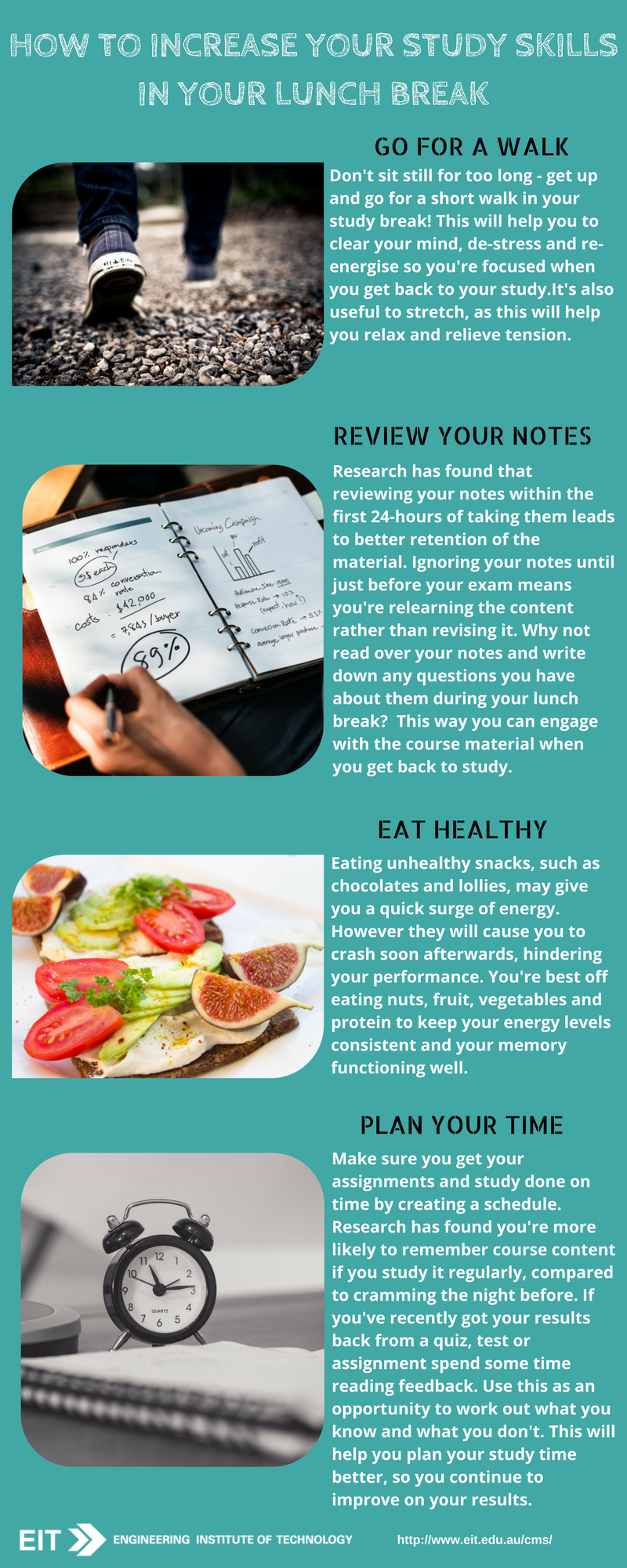
- Details
- Written by: Ruth Kennedy
The staff at EIT in Perth, Western Australia recently participated in a grammar workshop presented by Danielle Techera our Project and Resources Officer.
If you are looking for some hints and tips on how to improve your English grammar please watch this informative PowerPoint presentation.
- Details
- Written by: Ruth Kennedy
Do you need work as a Control and Instrument Technician, Maintenance Electrician or Mechanical Technician? Z-Tech Control Systems is a UK company that provides engineering solutions for Water Utilities, Power, and Rail. They know first-hand the high quality of EIT’s students and graduates and are currently looking for talented individuals to join their team.
The skill sets in demand include:
Control and Instrument Technician
· Time served apprenticeship supported by a minimum level 3 formal qualification. E.g. City and Guilds, BTEC, ONC/HNC/HND/Australian/New Zealand Qualifications or equivalent
· Experience of process control and electrical systems
· Experience working with and understanding PLCs to include management and certain programming
· Knowledge working with communication protocols
· Experience in calibration and maintenance of frontline instrumentation and a good understanding of relay logic as well as the ability to maintain and repair
Maintenance Electrician
· Time served apprenticeship supported by a minimum level 3 formal qualification. E.g. City and Guilds, BTEC, ONC/HNC/HND/Australian/New Zealand Qualifications or equivalent
· 17th edition BS7671 Electrical Wiring Regulations
· A minimum of 3 years post-apprenticeship experience of industrial electrical testing maintenance and installation such as motors, circuits, distribution, etc.
Mechanical Technician
· Time served apprenticeship supported by a minimum level 3 formal qualification. E.g. City and Guilds, BTEC, ONC/HNC/HND/Australian/New Zealand Qualifications or equivalent
· A minimum of 3 years post-apprenticeship experience in all aspects of industrial mechanical tasks
All expressions of interest are assessed by Z-Tech’s Technical Engineering Team. Applicants should have the right to work in the UK to be considered.
EIT is not part of the decision-making process and is acting as a communicator of this opportunity for our students and graduates.
If you are interested, please contact Mrs Carolina Asenjo by email (
- Details
- Written by: Steve Steyne
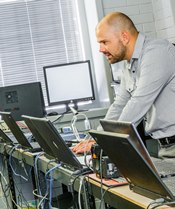 I have seen it; the future of engineering education and training. I have seen how it will equip engineering professionals globally and enable them to continue contributing to the turning of our world.
I have seen it; the future of engineering education and training. I have seen how it will equip engineering professionals globally and enable them to continue contributing to the turning of our world.
Acquiring professional development in engineering is changing; this process can be tracked by looking at the adaptations and growth of the Engineering Institute of Technology (EIT).
Over 25 years ago EIT was providing short classroom courses and onsite workshops. With the emergence of the internet the college began to keep an eager eye on the opportunities this would present to the world of engineering education.
Half a million students have since flown through our programs.
About ten years ago a live, online learning platform was devised for a range of accredited vocational qualifications. This enabling technology was one thing, but was never going to supersede a great teacher: the expertise of engineering professionals from around the world, with real industry experience, was the key. Their years in the trenches have been used for content development and for teaching. They also contribute to the creation of remote laboratories and simulation software.
The Internet-of-Things (IoT) has meant that our students can ably complete their practical learning via these remote labs; the reality is that most engineering tools are linked to the internet. I oversee the setting up of our virtual labs; they are connected to real engineering machinery that our students log into from across the globe.
Three years ago the college’s scope broadened with the accreditation of a range of Bachelor and Master Degrees, also delivered online. The reach of this learning platform has meant that EIT’s alumni hail from 146 countries.
One of the overarching benefits of connecting with students remotely, of removing a campus from the mix, is that they can attain their professional development and accumulated qualifications alongside full-time work.
I recently attended a schools’ career expo in South Africa and witnessed the hunger and passion of young students wanting to pursue engineering as a career. Despite the connectivity of young people we realised that school leavers do indeed benefit from face-to-face education, from engaging with their peers and lecturers on campus.
The institution’s latest achievement is the opening of a higher education campus in Perth, Western Australian. The traditional classroom has been blended with the ever-improving technologies surrounding online learning. This ensures that our international, engineering experts are still streaming into the classroom for the on-campus students.
It is an incredible privilege to be the Deputy Dean of Engineering at the college and I am certain that EIT will continue to explore innovative and meaningful education for engineers today and into the future.
- Details
- Written by: Amber Allen
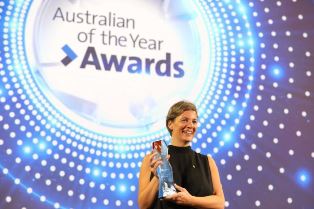
Professor Michelle Simmons is the most recently crowned Australian of the Year. A true testament to quantum physics, science more broadly, women, and Australia - we take a quick look at Simmons' work, and the achievements that led to her becoming the recipient of this most prestigious award.
The British born quantum physicist moved to Australia in 1999 and has never looked back. She cites the curious and driven attitude of scientists here and their willingness to collaborate as some of the perks of conducting research down under.
Her long term goal is to invent the quantum computer, and progress is looking very promising so far. In 2012 Michelle and her team worked to create the world's first single atom transistor, an astounding 4 atoms wide. The transistor is a vital step for reading and and controlling 'qubits', the unit of measurement in all things quantum. Currently based at UNSW, Michelle founded Silicon Quantum Computing in 2017, the first ever quantum computing company on Australian shores.
On a recent interview on RN Breakfast following the AoTY ceremony last Thursday, Simmons explained to host Fran Kelly some of the finer points in her complex field of expertise. Where classical computing works by following one item of code after another, quantum computing works in parallels. Wherever there is a large quantity of data, potentially with many variables, a quantum computer could translate it into real world data instantaneously. This would rapidly increase efficiency in an array of systems used daily on a global scale. Think weather prediction, drug study and design, predicting traffic and cutting fuel costs, to name a few.
On a personal level, Simmons is a believer in perseverance and "doing things that are hard, as they are the most rewarding". She intends to use her platform as Australian of the Year 2018 to encourage young Australians to interrogate the world around them and create new technologies. She also wishes to promote women in quantum physics, with a mere 5% of the industry being female.
Sources:
ABC Radio National. (2018). Quantum physicist Michelle Simmons named Australian of the Year. [online] Available at: http://www.abc.net.au/radionational/programs/breakfast/quantum-physicist-michelle-simmons-named-australian-of-the-year/9364234 [Accessed 29 Jan. 2018].
Purdue University. (2012). One and done: Single-atom transistor is end of Moore's Law; may be beginning of quantum computing. [online] Available at: http://www.purdue.edu/newsroom/research/2012/120219KlimeckAtom.html [Accessed 29 Jan. 2018].
The Conversation. (2018). Award to Michelle Simmons reflects strategic importance of quantum physics for Australia. [online] Available at: https://theconversation.com/award-to-michelle-simmons-reflects-strategic-importance-of-quantum-physics-for-australia-90759 [Accessed 29 Jan. 2018].
- Details
- Written by: Quintus Potgieter
Working in a team is always challenging. With the increasing mobility of engineers and of people in general this is making team work even tougher. Engineering companies are inevitably employing professionals from an array of nations, creeds and walks of life. Most groups - let alone those with a broad diversity – will find they don’t always see eye to eye.
At world renowned engineering company Tesla, in the United States of America, 100 African-American employees (of 33,000 employees globally), have filed a class-action lawsuit against the company. They claim it has become a “hotbed for racist behavior” and has created a workplace where harassment is rife.

An excerpt of the complaint reads:
“Although Tesla stands out as a groundbreaking company at the forefront of the electric car revolution, the standard operating procedure at Tesla is pre-Civil Rights era race discrimination.”
It claims too that the age-old and contemptuous term for a black or dark-skinned person in the US has been bandied about within the company.
Elon Musk, CEO of Tesla, took to the in-company email system to address the claims being made and warned employees, in a down-to-earth manner, to proceed with caution in future:
“Part of not being a huge jerk is considering how someone might feel who is part of a historically less represented group. Sometimes these things happen unintentionally, in which case, you should apologize. In fairness, if someone is a jerk to you, but sincerely apologizes, it is important to be thick-skinned and accept that apology.”
The class action lawsuit follows a spate of job cuts at the company - Tesla recently let 400 employees go at once. The cuts come amidst a tight production schedule, as Tesla tries to meet their targets of their Model 3 electric vehicle.
The employee, who reportedly filed the class action suit, was terminated in October after reporting the racial issues to the Human Resources department and Musk himself.
Gender gap
Historically in engineering, there is a sizeable gap between the numbers of men versus women employees; this is aptly called ‘the gender gap’.
This year, James Damore, a software engineer working for Google, was fired for his seemingly politically incorrect views on why the gender gap in tech industries exists.
He wrote a ten-page document describing his view of sexism within Google. He explained that “not all of the male-female disparity in tech” was the result of sexism. He assigns the disparity to the fact that men and women are inherently different.
The leaking to the media of Damore’s document (designed as an internal memo) has resulted in a war of words between those of different political leanings. Having been subjected to internal diversity programs at Google Damore campaigned for the review of these methods; Google’s management did not take the criticism well, and let Damore go.
The Vice President of Diversity for Google, Danielle Brown said:
“Part of building an open, inclusive environment means fostering a culture in which those with alternative views, including different political views, feel safe sharing their opinions. But that discourse needs to work alongside the principles of equal employment found in our Code of Conduct, policies, and anti-discrimination laws.”

Upon hearing of his firing, the secret information publisher Wikileaks offered Damore a job.
Diversity in teams is not all bad – when managed well these work groups offer many benefits. The input from an array of cultural backgrounds and a mix of genders can inspire and drive innovation. Local market knowledge and insight can also give a company a competitive edge and therefore boost profitability. Analysis of teams with dissimilar nationalities and a healthy blend of men and women has found these groups to be more productive and to perform more efficiently. And interestingly, drawing employees from a culturally diverse talent pool increases a business’ ability to attract and retain the best people.
Works Cited
Hull, Dana. “Tesla Is a 'Hotbed for Racist Behavior,' Worker Claims in Suit.” Bloomberg.com, Bloomberg, 13 Nov. 2017, www.bloomberg.com/news/articles/2017-11-13/tesla-a-hotbed-for-racist-behavior-black-workers-claim-in-suit.
http://www.hult.edu/news/benefits-challenges-cultural-diversity-workplace/
- Details
- Written by: Quintus Potgieter
Being an engineer is by no means a boring job.
 However, most people will refer to their jobs similarly, that ‘work is work’; that it often involves a daily grind, a slog which is sometimes repetitive and monotonous.
However, most people will refer to their jobs similarly, that ‘work is work’; that it often involves a daily grind, a slog which is sometimes repetitive and monotonous.
Remarks delivered on a social forum for engineers also suggest the monotony that some feel in their engineering jobs.
It has been said that modern day engineering is 10 percent invention and 90 percent maintenance. Meaning, that engineers don’t do much design and development anymore, but rather, maintain what has already been engineered.
When talking about avoiding the monotony of being stuck in a repetitive engineering job, one process engineer with username ‘namkash’, said:
“I asked my boss to give me different tasks. He actually did when he noticed I was getting bored. So, I guess you can ask your boss.” “Try to work somewhere you feel comfortable and happy, at least surround yourself with good coworkers.”
Another engineer, under the pseudonym RallyMech, suggests that keeping your wits about you in a job like engineering involves not feeling like you should over perform. He says:
“Never forget that there is a difference between how much work you are expected to do, and how much you are capable of. Engineers are rarely rewarded for projects that are ahead of schedule. They are expected to finish projects on time and under budget.”
He also mentioned that he fills part of his time becoming more proficient on software like CAD, refines shelved projects and sometimes does market research.
Whilst the opinions of engineers on social media sites should be taken with a grain of salt, the modern day idea of ‘work’ is an ever changing one. There are certain jobs within engineering which involve variety, but inevitably there are those which include repetitive tasks.
It is always worth considering a move to ensure you are in an environment where you are learning new skills and being challenged.
But can one be forced into doing a monotonous job that just doesn’t inspire any form of creativity? There are some women in engineering who may be able to answer this question.
Who does the chores?
The distribution of ‘cool’ roles gets distorted when the historical gender gap in engineering causes age-old exclusion. An investigation into gender parity of engineering courses in universities was conducted by a group of students from the University of California at Irvine, MIT, McGill University and the University of Michigan in 2016.
 The investigation, which produced a report in the journal Work and Occupations, involved following 40 undergraduate engineering students of both genders. Twice every month the students wrote about their comings and goings in the course.
The investigation, which produced a report in the journal Work and Occupations, involved following 40 undergraduate engineering students of both genders. Twice every month the students wrote about their comings and goings in the course.
At the end of the experiment the researchers had 3,000 diary entries from which to generate data. They found that the females were generally excluded from all the fun stuff. An excerpt of the report read:
“There was this one case where, in our design class, two girls in a group had been working on the robot we were building in the class for hours, and the guys in the group came in and within minutes had sentenced them to doing menial tasks while the guys went and had all the fun in the machine shop.”
It is the monotony of menial tasks, and being forced to do them, which has discouraged some women fro pursuing careers in engineering. The automation of all repetitive tasks may, however, make all menial tasks redundant. Engineers will have to step up to ensure they are creative and design-savvy, to ensure they cope with the ‘cooler’ stuff, while the robots tackle the rest.
Engineering happiness
Happiness in your engineering job is absolutely crucial. The Dean of the Engineering Institute of Technology Steve Mackay, has a rule-of-thumb that you can use to measure your happiness by:
Works Cited
Images from Pixabay.com
Tekla S. Perry
Posted 17 Jun 2016 | 16:00 GMT. “Are Women Exiting Engineering Because Men Have All the Fun?” IEEE Spectrum: Technology, Engineering, and Science News, 2016, spectrum.ieee.org/view-from-the-valley/at-work/tech-careers/are-women-being-pushed-out-of-engineering-because-men-have-all-the-fun.
“How Do You Deal with Monotony • r/Engineering.” Reddit, www.reddit.com/r/engineering/comments/75c8u2/how_do_you_deal_with_monotony/.
- Details
- Written by: Evangeline Newby

Are you after an exciting job that takes you around the world?
Actura is looking for a Tour Group Manager who will be trained to facilitate guided tours around the NASA space grounds in the United States!
About Actura
Actura Australia offers a world-class learning environment as the exclusive Australian partner of the Space School international study programs; and the worldwide partner delivering CASE curriculum-based robotics program. Established in Australia in 2014, Actura'a Australian team have delivered expeditions including students from 200 schools nationwide. As an innovative business, Actura has developed strong partnerships to bring Australian students the best of international STEM-skilled programs.
Actura focuses on the education of students by providing programs designed to broaden their minds, cultivate their drive, instill curiosity and the spirit of exploration, along with the values of pursuing learning excellence. In Australia, Actura is responsible for forming groups of participants from high school students; managing those customers (school management, students and parents); booking all flights; appointing and training tour staff; and liaising with US operations to organise the on-the-ground tour component.
Details
For further information on Actura, please visit their website: http://actura.com.au/
- Details
- Written by: Quintus Potgieter
Old-timers, let alone prospective engineers, can sometimes get lost in the buzzwords that the industry throws at them. And then there are those skills that are hugely useful, but not adequately covered within an engineering curriculum. Critical thinking is both a buzzword and an intangible, soft, but incredibly handy skill.
But what is critical thinking? The National Council for Excellence in Critical Thinking in 1987 fashioned a definition:
“Critical thinking is the intellectually disciplined process of actively and skillfully conceptualizing, applying, analyzing, synthesizing, and/or evaluating information gathered from, or generated by, observation, experience, reflection, reasoning, or communication, as a guide to belief and action.”
Critical thinking then, is the kind of skill an engineer should be equipped with before moving forward into an engineering career. The question is: Can critical thinking be taught? Educational institutions are attempting to impart this illusive skill before students even reach the tertiary education level.
How institutions are doing it today
 Many educators providing subjects which a focus on science, technology, engineering and mathematics (STEM) are using various initiatives to inspire critical thinking and problem solving. Examples of these are school clubs for robotics’ enthusiasts, electric circuit board projects, and general engineering weeks. Students who are involved get to physically tamper with actual, tangible engineering elements during class; to nut out solutions, to nurture and discipline their creativity streaks. Some schools are hosting STEM-camps that provide children the opportunity to problem solve and tap into their more advanced levels of cognition.
Many educators providing subjects which a focus on science, technology, engineering and mathematics (STEM) are using various initiatives to inspire critical thinking and problem solving. Examples of these are school clubs for robotics’ enthusiasts, electric circuit board projects, and general engineering weeks. Students who are involved get to physically tamper with actual, tangible engineering elements during class; to nut out solutions, to nurture and discipline their creativity streaks. Some schools are hosting STEM-camps that provide children the opportunity to problem solve and tap into their more advanced levels of cognition.
Critical thinking and problem solving are encouraged within STEM-focused subjects, but some institutions reckon that to ably facilitate students to adopt these skills something is being left out.
Hence the rise of STEAM: science, technology, engineering, arts and mathematics. Educators have begun adding subjects usually relegated to the Arts to inspire and improve analytical thought from students preconditioned to mastering STEM-focused subjects. For critical thinking to occur self-awareness and emotional intelligence are useful and these skills are ignored or may get lost, through a lack of nurturing, when students focus on STEM alone. There is a shift occurring: subject matter from the Humanities Faculty is entering engineering curriculums.
Bloom’s Taxonomy
Engineers might have their institutions of education to thank for the careers they have today; many schools during the last few decades have utilized the psychological framework of Benjamin Bloom.
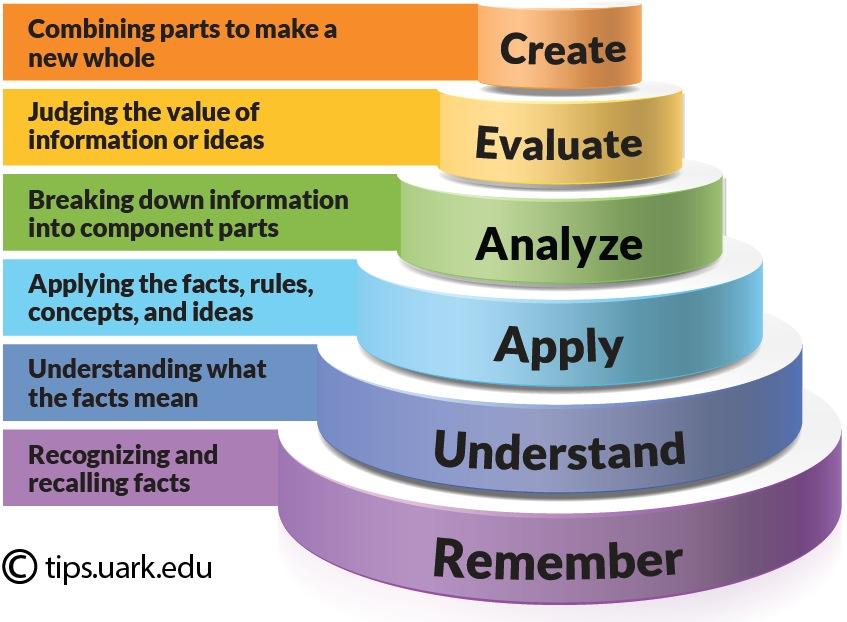 Bloom was an American educational psychologist who contributed to the theory of mastery learning in the 50s. Some of his systems are used by schools and universities to this day. Many of his findings, on the levels of learning, are undeniably useful for the teaching of engineering. For exams, assignments, and general engineering projects, his six levels of learning can help an engineer improve both their knowledge and their efficiency and boost their critical thinking skills simultaneously:
Bloom was an American educational psychologist who contributed to the theory of mastery learning in the 50s. Some of his systems are used by schools and universities to this day. Many of his findings, on the levels of learning, are undeniably useful for the teaching of engineering. For exams, assignments, and general engineering projects, his six levels of learning can help an engineer improve both their knowledge and their efficiency and boost their critical thinking skills simultaneously:
1. Knowledge - count, define, describe, draw, find, identify, label, list, match, name, quote, recall, recite write
2. Comprehension - conclude, demonstrate, discuss explain, generalize, identify, illustrate, interpret, paraphrase, predict, report, restate, review, summarize, tell
3. Application - apply, change, choose, compute, prepare, produce, role-play, select, show, transfer, use
4. Analysis - analyze, characterize, classify, compare, contrast, debate, deduce, diagram differentiate, discriminate, distinguish, examine, outline, relate, research, separate
5. Synthesis - compose, construct, create, design, develop, integrate, invent, make, organize, perform, plan, produce, propose, rewrite
6. Evaluation - appraise, argue, assess, choose, conclude, criticize, decide, evaluate, judge, justify, predict, prioritize, prove, rank, rate, select.
Through Bloom’s Taxonomy, designs and calculations can undergo levels of variance that can improve an engineer’s approach to projects and strengthen his/her ability to think critically.
Graduates need critical thinking - it’ll get them the job
Ersnt and Young, the multinational professional services company, believes critical thinking can set you apart as a graduate.
“Academic qualifications will still be taken into account and indeed remain an important consideration when assessing candidates as a whole, but will no longer act as a barrier to getting a foot in the door. Our own internal research of over 400 graduates found that screening students based on academic performance alone was too blunt an approach to recruitment.”
And as Einstein claimed: “The value of a college education is not the learning of many facts, but the training of the mind to think.”
Works Cited
Defining Critical Thinking. Web. 29 Aug. 2017.
Bloom, Benjamin Samuel. Taxonomy of Educational Objectives. N.Y.: Longmans, Green, 1956. Print.
- Details
- Written by: Sharne
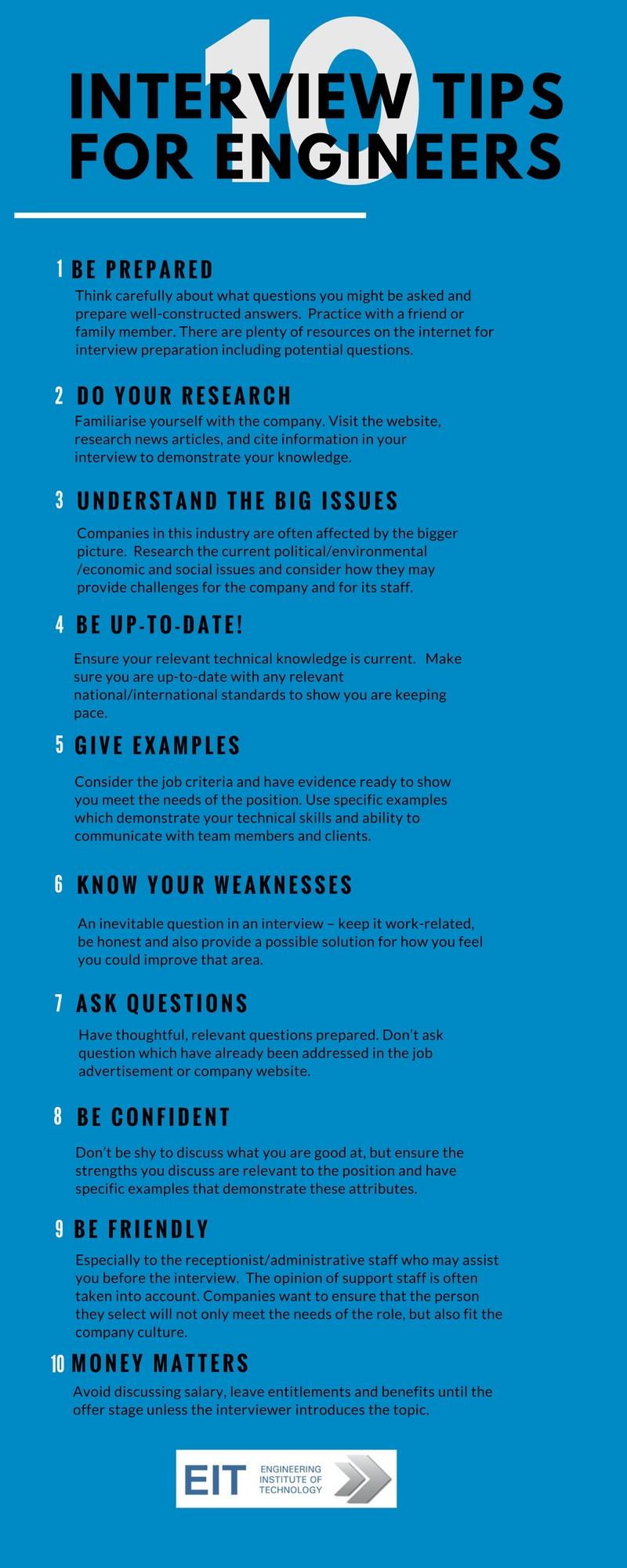
Be prepared. Think carefully about what questions you might be asked and prepare well-constructed answers. Practice with a friend or family member. There are plenty of resources on the internet for interview preparation including potential questions.
Do your research. Familiarise yourself with the company. Visit the website, research news articles, and cite information in your interview to demonstrate your knowledge.
Understand the big issues. Companies in this industry are often affected by the bigger picture. Research the current political/environmental /economic and social issues and consider how they may provide challenges for the company and for its staff.
Be up-to-date! Ensure your relevant technical knowledge is current. Make sure you are up-to-date with any relevant national/international standards to show you are keeping pace.
Give Examples. Consider the job criteria and have evidence ready to show you meet the needs of the position. Use specific examples which demonstrate your technical skills and ability to communicate with team members and clients.
Know your weaknesses. An inevitable question in an interview – keep it work-related, be honest and also provide a possible solution for how you feel you could improve that area.
Ask Questions. Have thoughtful, relevant questions prepared. Don’t ask question which have already been addressed in the job advertisement or company website.
Be confident. Don’t be shy to discuss what you are good at, but ensure the strengths you discuss are relevant to the position and have specific examples that demonstrate these attributes.
Be friendly. Especially to the receptionist/administrative staff who may assist you before the interview. The opinion of support staff is often taken into account. Companies want to ensure that the person they select will not only meet the needs of the role, but also fit the company culture.
Money matters. Avoid discussing salary, leave entitlements and benefits until the offer stage unless the interviewer introduces the topic.
- Details
- Written by: Quintus Potgieter
 Advancing from technician, to engineer, to senior engineer, to management, to the 30-years-of- service gold watch at retirement. Is this the picture of an ideal career trajectory? Is it realistic?
Advancing from technician, to engineer, to senior engineer, to management, to the 30-years-of- service gold watch at retirement. Is this the picture of an ideal career trajectory? Is it realistic?
To bolster CVs or resumes engineers look to work for major companies and then hope for promotions within them. In an effort to have the edge they attempt to remain abreast of the shifts in industry and galloping technology. To this end continuing professional development, and indeed qualification upgrades, can help.
Unfortunately acquiring new and relevant skills does not always equate to moving upwards in a company. To be positioned well for specific promotional positions in a company is difficult and to add to the challenge there are other equally driven team members in the race too.
What do engineering companies want?
Some institutions offering engineering education and training closely monitor the shifts within engineering disciplines, in an effort to offer courses that ensure students receive industry-relevant qualifications. But this alone is not always enough. Students also need to have nurtured certain qualities which will benefit a company.
For example, IT and engineering are intersecting and engineering courses are now including modules once never utilized. It is, however, up to engineers to grow their skill sets across disciplines and industries (including skills which are not all technical), to position themselves for better career prospects.
Iowa State University has outlined 15 skills employers most want to see in engineering graduates:
- Engineering knowledge
- Communication
- Professionalism
- Planning
- Safety Awareness
- Quality Orientation
- Cultural Adaptability
- General knowledge
- Innovation
- Teamwork
- Continuous learning
- Analysis & Judgement
- Integrity
- Customer focus
It is becoming clear that engineering employers today require engineers to be multitalented. Gone are the days when engineers could disappear behind the scenes within a certain skill set; now they need to work on becoming entrepreneurial and capable across industries.
Flexibility is key, particularly for ambitious engineers and for those who would like to start their own businesses.
You’re in...now what?
Once in a company engineers must prove that they can deliver efficient performance that benefits the company in order to gain promotions. This can sometimes be achieved through getting Six Sigma certification.
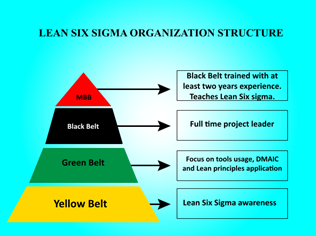
Source: Wikipedia
Six Sigma is a set of quality and process analysis techniques developed within Motorola in the 1980s. Thereafter, in 1995, it was turned into business and employment requirements by General Electric. It refers to the training and processes engineers can utilize within a company to minimize waste and work efficiently on their projects.
The levels are referred to as Belts (similar to those used in the Martial Arts). The levels progress upwards through the belt colors with each achieved through the defining, measuring, analyzing, improving and controlling of the assigned projects within the company. The engineer who reduces process cycle time, reduces costs and increases customer satisfaction has a better chance of getting promoted within an organization.
Getting certified in Six Sigma may make an engineer stand out, particularly in a business which requires a mandatory level of certification in the methodology.
There is, however, any number of ways to skin a cat, as the saying goes. There are many who would swear that Six Sigma can fine-tune working environments, but it has also been suggested that it can drain employer creativity. And what are engineers without this?
Some intelligent comments follow. They point out some simple truisms:
Nothing great was ever achieved without enthusiasm – Ralph Waldo Emerson
There are no secrets to success; it is the result of hard work, preparation and learning from failure – Colin Powell
Success is liking yourself, liking what you do and how you do it – Maya Angelou
And the final one advises that we hone our ability to work as part of a group:
Great things in business are never done by one person. They’re done by a team of people – Steve Jobs
Works Cited
"Understanding What Employers Look for in Engineers." Engineering Career Services. Web. 18 Aug. 2017.
Wheat, Barbara, Chuck Mills, and Mike Carnell. Leaning into Six Sigma: The Path to Integration of Lean Enterprise and Six Sigma. Boulder City, NV: Pub. Partners, 2001. Print.
Golding, Ian. shhhhh-dont-mention-six-sigma-the-truth-behind-the-stigma Web. 16 Sept. 2013
https://www.prdaily.com/Main/Articles/30_inspiring_quotes_about_business_marketing_and_c_14073.aspx
- Details
- Written by: Steve Mackay
Dear Colleagues,
 Last night at a Careers Expo attended by happy throngs of kids and parents, one dad (a practising engineer) indicated to me that he had advised his two kids who were shortly finishing high school to avoid an engineering career and to focus on more lucrative jobs such as in law or merchant banking. I sympathise with him as many of my engineering friends have been caught out in the intermittent ‘down draughts’ and thrown onto the streets.
Last night at a Careers Expo attended by happy throngs of kids and parents, one dad (a practising engineer) indicated to me that he had advised his two kids who were shortly finishing high school to avoid an engineering career and to focus on more lucrative jobs such as in law or merchant banking. I sympathise with him as many of my engineering friends have been caught out in the intermittent ‘down draughts’ and thrown onto the streets.
I am not so sure though
However, I am not so sure that lawyers and merchant bankers are able to find good jobs either. There is a ferocious amount of automation going at present with a lot of legal jobs being automated (you can buy a proforma contract document for a few dollars or even an hour of cheap legal advice online nowadays). Business graduates are ‘a dime a dozen’ these days because of the massive growth in these university programs.
The challenge with Engineering Jobs
The reason why most of my engineering buddies have been ‘let go’ (i.e. fired) was because a particularly large project they were happily engaged on had suddenly finished. Generally this is often done unpredictably and driven by a sudden impatience in the client who had run out of patience (and money) in ever seeing the end of that particular project.
Others have lost jobs because of a change in technology meaning that their current company was increasingly unprofitable. Sometimes, these engineers worked for a start-up firm where the blue sky prognostications of the business entrepreneur had met reality in terms of massively disappointed investors who bolted for the exits when the losses seemed to go on forever. And suddenly everything was then shut down.
Other friends lost jobs because their skills had become outdated and they had lost their verve in constant reskilling and sharpening their knowledge. Some of them had often lost enthusiasm for their jobs – perhaps tired of doing the same old thing every day.
When you read the previous paragraphs, you may come to the conclusion that engineering is a hopeless case for someone looking to the future stability in income. I do believe you can deal with these issues in a proactive way.
There are Huge Opportunities in Technology and Engineering
You only need to look at some of the most profitable companies in the world – they are all based around engineering and technology. Such as Apple, Exxon Mobil, Samsung, Berkshire Hathaway (incl. rail and food) and Chevron. Companies largest by revenue such as Saudi Aramco, Shell, Volkswagen and Toyota also employ huge numbers of engineering professionals. There are huge and growing opportunities in the new technologies such as the Internet of Things, Cloud computing, automation and driverless cars. The list seems endless and constantly growing.
The key thing is to wrap yourself up in a ‘Secure-your-career’ blanket to deal with the sudden changes you may be exposed to such as described above.
What is a ‘Secure Your Career’ Blanket ?
When commencing your engineering career you need to plan for the worse but to rejoice in continuing good fortune. A few key elements here would include the following.
Business Skills are Critical
One area which I believe engineering professionals are short changed is in not having sufficient business skills. After all – the pointy business end is where the bills are paid and decisions are made in a company.
These sort of skills include finance/accounting/marketing and law. With this know-how; you can participate more effectively in your business and indeed help steer it out of choppy waters and keep it going. Or at least help management make good decisions by giving a business perspective to your engineering role. You can also quickly identify when things are becoming unsustainable with your current employer and start looking at alternative scenarios.
Consistent Achievers in Engineering
Following on my comments on business skills above, when I think of engineering colleagues who have done well consistently, it is those who are entrepreneurial and have strong business skills either formally or through on-the-job learning. As a result, they are more attuned to dodging the curved balls coming in from all directions – something which is increasingly the case these days. I know that ‘pure’ engineers will be somewhat disparaging about people with business skills remarking that they are no longer engineers but business people. But a mix of engineering and business skills definitely makes you more saleable and able to sustain your career.
Make Yourself Indispensable in your job
You should ensure that you are the go-to expert in your firm. Other skills that ensure you stand out are the ability to write and communicate well. This helps upper level management and other spheres of the business gain a better understanding of what you do and why you are valuable.
Stay up-to-date at all times
Keep sharp with your knowhow and skills level. Ensure that you are constantly learning new techniques and applying new technologies. Not necessarily attending formal courses but in linking with people engaged in pioneering work.
Finally, keep everything relating to your online career up to date. This means not only your resume but LinkedIn profile and other social media sites. Ready to go when things start breaking up around you and you need to move or to seize a new opportunity.
Overall
Overall, I believe having a job is akin to surfing. You can ride a really good wave for a while but eventually when you hit the shore you have to paddle back and look for the new wave. With different characteristics and twists and turns.
Always remember Alfred Montapert’s comment: ‘To accomplish great things we must first dream, then visualize, then plan... believe... act’
Yours in engineering learning
Steve
- Details
- Written by: Quintus Potgieter
Engineers have IQ mastered, but do they have emotional intelligence (EQ)?
An engineer takes to a popular engineering online forum and writes: “I can’t get a job because I’m too awkward. Has anybody else been turned down for a job because they lack people skills and/or emotional intelligence?”
The big question is: Do engineers need well developed EQs? The answer is a resounding ‘yes’. As the forum writer above points out: the need for it begins with the interview. Then there are engineers in the workplace completing projects in teams, negotiating with clients etc – all of which requires some emotional intelligence.

Emotional Quotient or Emotional Intelligence (EQ or EI) are terms created by two researchers in 1995 – Peter Salavoy and John Mayer. Psychologist and behavior science journalist, Dr. Daniël Goleman, then introduced the concept to the public and popularized it in 1996 with his book simply called “Emotional Intelligence”.
Goleman was merely using a pithy phrase for what was already known as the ability to recognize, understand and manage our human emotions. The definition has grown to include the understanding and influencing of others. This aspect of EQ would be familiar to engineering managers; and they would understand the inherent difficulties involved.
The blunt truth is that engineers who struggle with EQ may indeed hinder their career growth potential. According to Talent Smart, people with higher EQ make an average of $29,000 more per year than people with low EQ. Not only is EQ good for career success, but it can dictate success when it comes to entrepreneurial endeavor too.
Can it be taught?
Corporate Training International has summarized the kinds of skills people need to hone in order to function efficiently in the corporate world:
- Self awareness
- Self regulation
- Self motivation
- Empathy
EQ is a big help when it comes to making and sustaining relationships in the work place. In an engineering sense, working together efficiently and all being ‘on the same page’ are elements crucial to a synergetic workforce.
There are steps that we can take to contribute to our own well being and to the well being of a workplace. Conflicts, for example, can threaten the equilibrium within a team if handled without emotional intelligence. The following may be useful when attempting to establish a healthier EQ:
- Form new habits
- Care about others’ feelings
- Keep your emotions in check
- Integrate yourself into others’ lives sensitively.
- Take and accept criticism
- Learn from your mistakes

Happiness
The Dean of Engineering at the Engineering Institute of Technology, Steve Mackay, reckons that engineers must be happy in their workspaces, but understands that work pressures can dampen an engineer’s enthusiasm. Mackay calls it the Rule of Two Thirds for Happiness - and thinks engineers should live by the rules and re-evaluate according to the rules every week.
- Are you satisfied with your job?
- Are you comfortable with where you live?
- Do your have fulfilling relationships?
If you can manage two of those three, you should count yourself happy, says the Dean. And, interestingly, happiness is the best environment for a maturing emotional intelligence. A depressed, clouded mind is less likely to make a contribution at work whereas an engineer who has reasons to be positive will become more emotionally astute and resilient and consequently, more productive at work.
Thanks very much to Henlie Holm who inspired and contributed to this article.
Other works cited:
Wallace, Brian. "Emotional Intelligence Is Necessary for You, in Any Field; Here Is Why." Business Standard. Business-Standard, 18 July 2017. Web. 07 Aug. 2017.
CORPORATE TRAINING. 2017. Emotional Intelligence - Training material for trainers. www.corporatetrainingmaterials.com Date of access: 23 June 2017.
- Details
- Written by: Allison
 We have all heard of the common engineering jobs such as Electrical Engineer, Civil Engineer, Mechanical Engineer and Software Engineer; let’s take a look at some of the uncommon and perhaps ‘cool’ engineering jobs that actually do exist.
We have all heard of the common engineering jobs such as Electrical Engineer, Civil Engineer, Mechanical Engineer and Software Engineer; let’s take a look at some of the uncommon and perhaps ‘cool’ engineering jobs that actually do exist.
- Details
- Written by: Quintus Potgieter
Are you willing to travel internationally for work and study?
This is a loaded question. A range of considerations would be pondered and include family, need for excitement, ambition, prospects etc.
Few academic qualifications have the global allure that engineering does. And some engineers are characterized by their determination to acquire those credentials which enable them to take on the world.
Most people, however, are more content to remain in their communities, to study, work and raise their families within the familiarity of ‘home’. And then there are those that might develop a thirst for travel and work, but are unsure how to start; how to make their qualifications mobile, how to look for opportunities that could take them elsewhere.

An occupation in high demand in Australia for example, is engineering and they have recently amended their temporary and skilled visa occupations list. Engineers looking to work on another continent, therefore, should note such changes to policy.
For work experience abroad, specifically in Australia, there are two options for qualified engineers.
Option 1: The Skilled Recognised Graduate Visa
If a qualified engineer is under 31 years of age he or she can apply for the Skilled Recognised Graduate Visa. If, after getting a taste for it, the engineer would like to settle in Australia, an application to do so can be made.
Interestingly, the Australian government does not require previous work experience from those engineers who want to apply for this visa. Spouses and dependent children can go too.
Option 2: Skilled Independent Visa
Engineers over the age of 31 are able to apply to immigrate to Australia, with their spouses and children. In fact qualified engineers are on the Medium and Long-term Strategic Skills List (MLTSSL) that the Australian government has set out. At times the Australian government has been known to recruit from overseas if certain skill sets are required.
There is nothing quite like engineering when it comes to being a vital contributor to the infrastructure of a country. Engineers have the necessary skills to keep a country running. It is when gaps in these skills are perceived that governments actively recruit from overseas.
Immigration Minister of Australia, Peter Dutton, has indicated that their recent policy changes are a reflection of the ‘genuine skill needs in the labor market’.
Check your eligibility here: LIST OF ELIGIBLE SKILLS OCCUPATIONS
Another reason to travel abroad is for study
For a student to study overseas he or she must be accepted by an education institution, one that has been registered to accept international students.
In Australia the registering body is the Commonwealth Register of Institutions and Courses for Overseas Students (CRICOS). It is responsible for ensuring their education facilities and courses are up to scratch.
 Australia is a popular study destination and this has made its study centres richly diverse, with people from all over the globe acquiring qualifications.
Australia is a popular study destination and this has made its study centres richly diverse, with people from all over the globe acquiring qualifications.
Studying overseas is appealing for a number of reasons. It provides students with the prospect of living in and experiencing a new environment for a number of years. It may also provide the students with learning opportunities that cannot be attained in their own countries. And it offers them the chance to work in other parts of the world.
For engineers who have a taste for travel the importance of obtaining globally recognized skills cannot be underestimated. It provides those, with this wanderlust, the opportunity to form part of a global engineering company that takes them around the world.
Works Cited
"Lists of Eligible Skilled Occupations." Department of Immigration and Border Protection. Web. 12 July 2017.
"Move to Australia." Move to Australia | Personal Consultations. Web. 12 July 2017.
- Details
- Written by: Quintus Potgieter

Getting hired at prominent engineering companies is a tough feat. You need the right set of skills and qualifications, together with relevant experience (in most cases) and convince them that you are indeed the right candidate for the job (often in a sea of applicants). Students graduating into the modern day workplace need slick, impressive curriculum vitae in order to catch recruiters’ attentions.
The disturbing part of this is the fact that the recruiter in many companies today is automated. This automated system, otherwise known as the Applicant Tracking System, does the initial culling of applicants, so presents new and unique challenges to those determined to find employment in the industry.
The Applicant Tracking System (ATS)
According to HireRight, 144 people apply for each entry-level position, and 89 people apply for each professional-level position within a medium-sized company. Those kinds of figures cause companies to look to automated software to sift through those applications.
They also report that more than 95% of organizations use ATSs, including almost all Fortune 500 companies. Even Google is establishing their own job classifieds service that will have its own beta applicant tracking system.
Brian Delle Donne, President of Talent Tech Labs - a higher education research firm - recently spoke to Forbes about the Applicant Tracking Systems. He said:
“Applicant Tracking Systems arose as a system of compliance or record keeping for companies. Companies used them to keep track of who was applying to their jobs, as well as to manage scheduling and interviewing and candidate contact management. I say compliance because companies need to demonstrate they are equal opportunity employers, so Applicant Tracking Systems are used to keep tabs on applicants in terms of gender and race and demonstrate that no discrimination is occurring. So Applicant Tracking Systems quickly became the system of record for hiring. Early systems also had rudimentary capabilities around matching keywords in the job description to keywords in the resume.”
The filtering software is used to minimize the time spent combing through thousands of applicants in the present day; the review of applicants has become an automated process. Sadly, some applicants are in danger of being filtered out, if their curriculum vitae do not meet the keyword requirements of the software. Whether it is the system or the CV that is at fault – with this system (as with the old) there will always be occasions when both the company and the individual will miss out; the moment when an ideal applicant ‘falls through the cracks’.
On the other hand, as with many new technologies and inventions, the law of unexpected consequences has raised its ugly head: Delle Donne says that students now go out of their way to pack their CVs with keywords so that the software notices their applications. There is no regard to whether those keywords actually truthfully represent them.
Experts have cautioned graduates to word their CVs with the appropriate keywords relevant to the job they are applying for.
Employers, too, have the responsibility to ensure their filters are not too stringent on applicants. Despite this there is the chance that good applicants are disregarded for their poor ability to write up an appropriate curriculum vitae.
Steve Mackay, the Dean of the Engineering Institute of Technology, has also weighed in on what a graduate’s curriculum vitae should look like for the modern workplace:
“First of all, focus on the job. Most people think they can use a generic resume because they apply for lots of jobs, that is a sure fire path to destruction. Make it simple; use simple english, laid out simply. Grammar and spelling must be one hundred percent accurate. Avoid excessive information; the twenty page CV has long since gone. Make sure there is lots of white space; it is very useful to put an executive summary at the top of the resume. Try to be specific. Your CV must have business strengths and business wins. And focus your search for the job you really want.”
Works Cited
Craig, Ryan. "The Importance Of Applicant Tracking Systems: An Interview With Talent Tech Labs." Forbes. Forbes Magazine, 28 Apr. 2017. Web. 22 May 2017.
EngInstTech. "ENN15 Constructing Your next Curriculum Vitae (résumé)." YouTube. YouTube, 21 Apr. 2016. Web. 22 May 2017.
"Meet the Robots Reading Your Résumé [Infographic] - HireRight Blog." Go to HireRight. Web. 22 May 2017.

